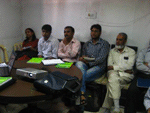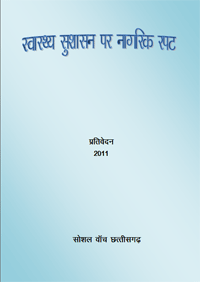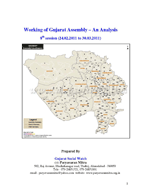India
|
Unlike many developing countries, India’s economy has been growing at a fast pace, enabling the government to mobilize the necessary resources internally for the achievement of the Millennium Development Goals (MDGs) by 2015. Its dependence on international aid, especially for financial resources is minimal; in fact it has declined bilateral aid from many countries. Despite this, however, the country has failed to achieve most of the goals and targets. The main reasons for this are inadequate funding, inappropriate administration and ignorance of policy and governance issues. Ultimately however, the failure is due to the absence of inclusiveness in the development model. Instead of enabling people to acquire basic needs such as food, sanitation, water, health care, the government is promoting ‘non-inclusive growth’ and has sought to provide basic services through subsidies with the associated problems of inefficiency and corruption.
The organized sector, which provides quality employment, employs only 12% to 13% of the workforce. The remaining 87% are relegated to agriculture and the informal sector with low and uncertain earnings. The crisis in agriculture, seen in the millions of farmers’ suicides, is now being exacerbated by climate change. Although the government has prepared an ambitious climate change action plan, the focus so far in implementing the plan is limited to investment and technology, ignoring critical issues such as equity, institutional capacity and good governance.
|
|
Source: 
. Published on Fri, 2013-02-08 23:00
|
|
Published on Tue, 2012-12-11 23:00
|
Published on Mon, 2012-03-05 08:00

Foto: Social Watch India
|
“La idea predominante que consiste en evaluar el desarrollo social en base al crecimiento económico debe cambiar, pues las inequidades aumentan en todo el mundo”, dijo el doctor Yogesh Kumar, director ejecutivo de la organización Samarthan y coordinador nacional de Social Watch India, en la presentación del Informe de Social Watch 2012 en la ciudad de Bangalore.
|
Published on Thu, 2012-01-26 07:40

Avenida Jangpura, en Nueva Delhi.
(Foto: April May/Flickr/CC)
|
La población de las ciudades de India afronta diferentes privaciones e inequidades, según un informe de la Organización de las Naciones Unidas para la Educación, la Ciencia y la Cultura (UNESCO), según informó el portal de análisis Governance Now. “Hay desigualdad, guetización, apartheid y segregación”, sostuvo uno de los responsables del estudio, Miloon Kothari, ex relator especial de la ONU sobre Vivienda Adecuada.
|
|
Published on Sun, 2011-12-11 23:00
|
|
La falta de planificación a largo plazo que ha caracterizado a los sucesivos gobiernos de India se percibe claramente en su crecimiento demográfico y en el aumento de las emisiones de CO2. Las recientemente propuestas “misiones” (o iniciativas de desarrollo sustentable) no solo son insuficientes sino que su eficacia, aunque mínima, continúa siendo incierta. Las recientes enmiendas de la largamente criticada Ley de Adquisición de Tierras de 1984 no son claras y fallan en el abordaje de los problemas. El Gobierno debe apoyar de manera plena las fuentes renovables de energía e integrar en la planificación del desarrollo la gestión de riesgo climático.
Si no lo hace, la totalidad de los escenarios futuros del país serán tenebrosos.
|
SUSCRIBIRSE A NUESTRO BOLETÍN
Enviar

|









